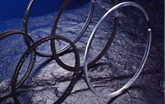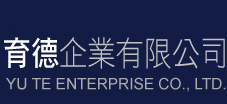| |
001.
 Basic functions of the piston rings
Basic functions of the piston rings
- Air
Density Functions: To avoid air leaking from the top of the piston
- Thermal
Conduction: Guiding the heat produced by the explosion via the
piston rings to the wall of the cylinder in order to disperse
heat.
- Lubricate
and scrape oil: Restrict excess oil in entering the chamber and
also aids in lubrication of the cylinder wall.
- Maintaining
the operation of the piston
002.
 The right piston rings for your engine
The right piston rings for your engine
As
compared to the size of an engine, the piston ring is relatively
small. Thus, generating a misleading concept of its importance.
In fact, the role of the piston rings impersonates the valve in
a heart. Inappropriate use will lead to high consumption of the
engine oil, scraping of the cylinder wall, reduced horsepower, increased
usage of petrol, increased noise pollution etc.
Due to the limited expertise and knowledge, a lot of smaller competitions
come up with products that are inferior in its outlook. Under close
examination, some minor characteristics of the piston rings are
inferior and go against the principal of the design; after the usage
of such products will lower the performance of the engine and cause
extreme damage to the engine.
By choosing RIKEN products, a world class and professional manufacturer
brand, will guarantee the quality of the piston rings, the only
way to enhance the life of an engine.
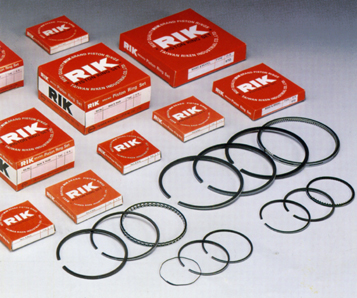
003.
 Meaning behind the engravings
Meaning behind the engravings
There
are two functions to the engraving on the side of the piston ring,
one is to point out the direction of the piston ring and the other
is to identify the size, the allocated space of the piston ring
and the manufacturing factory.
Due to its design, the piston rings must be installed appropriately
with the engravings on top. If not, it will not perform at its best;
on the contrary, it will cause severe damage to the cylinder.
The engravings on the right side of the piston ring is normally
used to distinguish the factory that produces it, For example, "R"
stands for Taiwan Riken Factory, "R1" and"R2"
stands for the placement of the pistons rings or "RN"
meaning the material used to manufacture RIK-20.
The engravings on the left of the piston ring indicates information
on the size of the outer diameter, if it has been enlarged. The
markings are as shown:
| Engraved
Markings |
Enlarged
Exterior Diameter |
Engraved
Markings |
Enlarged
Exterior Diameter |
| Without
Engraved Markings |
0.00mm |
100 |
1.00mm |
| 25 |
0.25mm |
150 |
1.50mm |
| 50 |
0.50mm |
200 |
2.00mm |
| 75 |
0.75mm |
250 |
2.50mm |
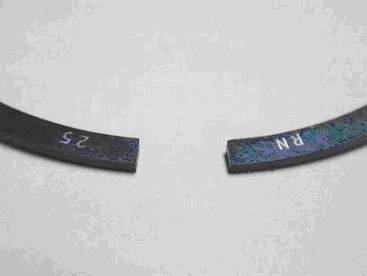 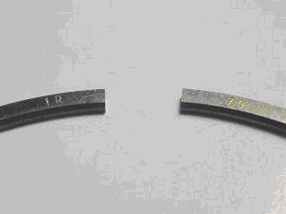
004.
 Important points for assembling piston rings
Important points for assembling piston rings
- The
piston rings need to be cleaned before installation and specific
tools are needed to install the piston rings.
- Start
the assembly from the bottom of the ditch, always ensuring that
the engravings are facing the top.
- Each
piston ring needs to be separated (avoid forming a straight line)
about 15 degree, and avoid the aperture in a 90 degree position.
- Notice
of the Steel Vent Assembly
4-1. Firstly place the spacer in
the ditch, ensuring that the pointed part is facing the top of
the piston ring and prohibited to overlap around.
4-2. Install 2 pieces of rail, ensuring
that the connecting part is about 15 degree apart.
4-3. After installation, ensure that
you are able to rotate the piston ring smoothly.
- When
installing piston rings with Coil or Expander, make sure that
the connecting points are 180 degree apart.
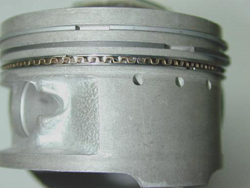 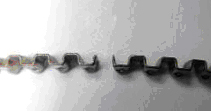
|
|
